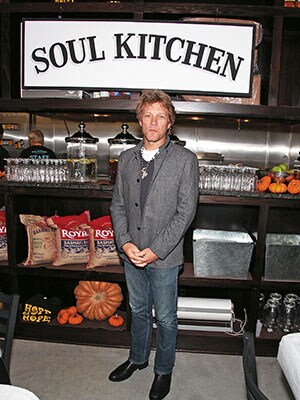Rockstar Bon Jovi and Philanthropy
Rock star Jon Bon Jovi has taken a new hands-on approach to hunger and homelessness


On December 4, 1956, Elvis Presley, Jerry Lee Lewis, Carl Perkins, and Johnny Cash teamed up for an impromptu jam session, forming an ephemeral supergroup nicknamed The Million Dollar Quartet. More than half-a-century later, this June, Jon Bon Jovi and Warren Buffett took the stage at The Forbes 400 Summit on Philanthropy’s after- dinner reception—capping a day of the world’s best business minds, from Bill Gates to Oprah Winfrey, brainstorming solutions to some of the world’s most pressing problems. The $50 Billion Duo then treated the 150 guests to a cover of Bette Midler’s ‘Glory of Love’, with Bon Jovi on acoustic guitar and Buffett on ukulele.
“This has been described as a once-in-a-lifetime experience, and you’ll understand why—once will be enough,” Buffett joked before the performance. His bandmate, meanwhile, professed to being more nervous than he gets before a stadium show: “The world’s greatest thinkers are here, the most generous hearts and minds and souls are here in the room.” Although Bon Jovi is worth well into nine figures—he’s kept the lion’s share of the $185 million Forbes estimates his band made over the past two years alone—he can’t touch Buffett in philanthropic scale. But as the number one celebrity, as ranked by Forbes, in terms of translating his fame into good, he pours his time and his name into his causes. Over the past six years, his Jon Bon Jovi Soul Foundation has given $6 million, building or restoring more than 300 housing units, and now holds $3 million to bankroll more.
The singer and his bandmates donated $1 million to Hurricane Katrina relief through Winfrey’s Angel Network, and the 28 new homes on Bon Jovi Boulevard in Houma, Louisiana, serve as a lasting reminder. He is a member of President Obama’s White House Council on Community Solutions, a group of 25 leaders trying to find new ways to reach disconnected youth.
But Bon Jovi’s magnum opus is the Soul Kitchen, a ‘recommended donation’ restaurant in Red Bank, New Jersey, launched last fall. The eatery’s core purpose is simple: To feed people in a dignified way that engenders self-respect. “We empower people by having them earn their meal working in the restaurant,” he says.
The suggested contribution for a meal is $10. Those who can pay more are encouraged to do so, while those who can’t are asked to bus tables, wash dishes, or volunteer to help other local causes.
The Soul Kitchen has served about 10,000 meals a guest chef series with appearances by Mario Batali and Tom Colicchio has helped juice the restaurant’s profile. So have the efforts of its founder—according to a study by data firm General Sentiment, Bon Jovi generated $449,932 in publicity value for the restaurant last year.
“I’m certainly willing to leverage my celebrity,” he said during the philanthropy summit. “If it means I have to come and sing at your kid’s bar mitzvah, I’m very available. Whatever it takes.”
That same year, Bon Jovi hired former IRS agent Mimi Box to help start the Philadelphia Soul Foundation, initially in conjunction with the Arena Football League team of the same name, which Bon Jovi co-owned. Shortly thereafter, Bon Jovi was walking through a dilapidated section of North Philadelphia with housing crusader Sister Mary Scullion, who suggested he fix one of the houses. The rock star asked how much it would cost to do the whole block—and eventually secured funding to restore 15 homes. After the Arena Football League suspended operations in 2009, he kept the charity going, rechristening it the Jon Bon Jovi Soul Foundation.
A few years later, Bon Jovi and his wife, Dorothea, saw a Brian Williams segment that featured a community kitchen in Denver called the So All May Eat Café. This was a place where people could volunteer to work in exchange for a healthy meal. That eatery had been inspired by a similar establishment in Salt Lake City called One World Everybody Eats.
“The key element that Salt Lake and Denver stressed to us was that you needed to find a location where you had a very supportive population and one that was in need, too,” says Box. “You need to have the intersection.” The Bon Jovis found that near their old stomping grounds in New Jersey. After piloting the restaurant concept in a church and a soup kitchen, they settled on a decrepit garage in Red Bank, turning it into a working restau- rant within a matter of months.
Next up: More Soul Kitchens, if all goes according to plan—something the old Bon Jovi might not have pursued. “That’s the difference between being a young man figuring out who you want to be and being a man who’s come of age who wants to leave a legacy of who he has been and who he will continue to be.”
First Published: Dec 03, 2012, 06:42
Subscribe Now